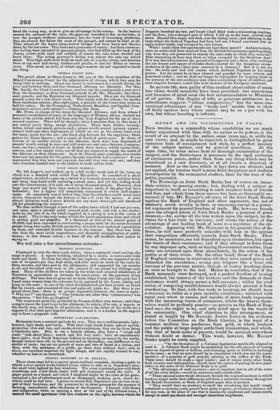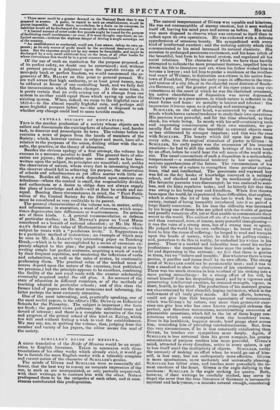MONEY AND ITS VICISSITUDES IN VALUE. Tests treatise on a
commodity whose capabilities we are much better acquainted with than with its nature or its 'rimers, is the result of an attempt by the author, some years ago, to settle his
own views ; and, as might be expected, is distinguished by great clearness both of arrangement and style, by a peffect mastery of the subject matter, and by general soundness. At the same time, its value arises from its thorough examination of the subject, and the distinctness it possesses by the rigid exclusion of extraneous points, rather than from any thing which may be considered as a new discovery, or at all events a discovery of moment. And as the laws which it lays down are abstract, and not applied, the treatise itself is more fitted for patient and studious investigation by the economical student, than for the uses of the public journalist. The Postscript on Joint Stock Banks has of course an imme-
diate relation to passing events ; but, dealing with a subject so important in itself, so interesting to such numbers both of friends and foes, and ‘Ibich from these causes has been so thoroughly ex- amined of late, Mr. BAILEY'S advocacy of the Joint Stock Banks against the Bank of England and other opponents, has not of necessity much novelty in facts or reasoning,except in a power- ful argument for general freedom of trade. He, however, founds upon the alleged action of Joint Stock Banks a proposal of great moment,—for, unlike all the late writers upon the subject, lie de• clares for a free trade in currency, and scouts the notion of the advantage of one leading bank of issue as a regulator of the cir- culation. Agreeing with Mr. GILHART in his general line of de- fence, he still more perfectly coincides with him in the opinion that competition effectually controls Joint Stock Banks. Their issues, he maintains, are not dependent upon themselves, but upon the wants of their customers ; and if they attempt to force them by any improper arts, such as buying Government securities, their notes are returned upon them immediately, by the action of the public or of their rivals. On the other hand, those of the Bank of England continue in circulation till they have raised prices and disturbed the circulation ; acting pro tempore like a bona fide increase of the precious metals, though of course breaking down as soon as brought to the test. Hence he concludes, that if the Bank monopoly were destroyed, and a perfect freedom of issuing established, the interest of the bankers and the demands of their customers would always secure a full currency ; whilst the rival action of competing establishments would always prevent it from overflowing. So that, with free trade in banking, we should have a currency as stable as a pure metallic circulation ; retracted with equal ease when in excess, and capable of more ready expansion with the increasing wants of commerce, whilst the issuers them- selves would be perfectly passive—as passive as the Bank of Eng- land says she ought to be, and only acted upon by the wants of the community. One chief objection to this arrangement, as stated at length by Mr. SAMUEL JONES LOYD in his evidence before the Committee on the Bank Charter, is the want of a common medium less ponderous than gold, in which bankers and the public at large might settle their transactions, and which, like that of bank-notes at present, would be received eveywhere without doubt or demur. This want, however, Mr. BAILEY thinks might be easily supplied,
. . . . .
"by the formation of a National Institution specifically adapted to meet it. A National Bank might be established for the sole purpose of issuing notes on deposit of specie or bullion, and returning specie or bullion in exchange for its notes ; so that no note should be in circulation which was not the repre- sentative of a quantity of gold actually existing in the coffers of the Bank. These notes should be made a legal tender ; and of course every other bank, both country and metropolitan, should have the option of paying its own paper either in the notes of the National Bank or in gold.
" The advantages of such currency—not to supplant, but in aid of the notes of all the other banks—would be numerous and considerable.
" These national notes would obviously furnish the required medium in which bankers might settle their differences, and form a universal currency throughout the British dominions, as Bank of England paper does at present.
" They would have no tendency to swell the circulation, but would simply substitute a currency easily passed front party to party, at whatever distance and for any sum, in the place of one that is necessarily cumbrous and inconvenient, except in small payments and amongst immediate neighbours.
" There never could be a greater demand on the National Bank than it was prepared to answer. A panic, in regard to such en establishment, would be almost impossible. Should there, nevertheless, be a drain on its resources, its liabilities would all be discharged the moment its coffers were exhausted. "A limited amount of notes under five pounds might be issued for the purpose of facilitating small remittances—or even, if it were thought expedient, an un- limited amount—without the slightest danger of driving a single sovereign out of the country.
"An establishment so conducted, could not, I am aware, defray its own ex- penses ; as its only source of profit would be the accidental destruction of its notes. But the expenses would not by any means be formidable, and might be discharge(' by a very small additional duty on the issue, of all other bunks for whose convenience this would be in a great measure instituted."
Of the use of such an institution for the purpose proposed, or of its perfect safety, no doubt can be entertained ; and, without at present passing a judgment upon the querstio vesata of a monopoly bank or perfect freedom, we would recommend the ar- guments of Mr. BAILEY on this point to general perusal. We are well aware that high authority, or at least great names, may be adduced in favour of one controlling bank, and we fully feel the inconvenience which follows changes. At the same time, it is pretty certain that no evils arising out of a change from one system to another could equal those which spring up under the existing system. When, indeed, we recur to the frightful ruin of 1825-6—to the almost equally frightful ruin, and perhaps still more frightful prospect before us—the mind is disposed to ask whether any change could lead to more terrible results.



























 Previous page
Previous page